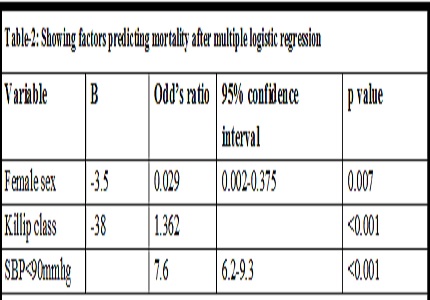Acute coronary syndrome in elderly – risk factors and in-hospital outcome
Abstract
Background: Elderly patients constitute a majority subset of population developing acute coronary syndrome. But specific risk factors and in-hospital outcome have not been well-studied.
Objectives: To study the risk factors and in-hospital outcome of people aged >60 years with acute coronary syndrome. Materials and
Methods: 220 patients aged >60 years admitted with acute coronary syndrome under Department of General Medicine (during a time period from 1st January 2015 to 31st December 2015) were studied between admission and death/discharge. All patients who opted for primary PCI and who left treatment before completion were excluded. Patients were grouped into STEMI, NSTEMI and unstable angina. Various factors affecting mortality were studied.
Results: After exclusion, 212 patients were included in the study. The mean age of men was 68±6 years while that of women was 71±7 years) (p=0.01). Modifiable risk factors were present in 84.9 % (n=180), most common risk factor observed was past history of systemic hypertension. (52.36%) (n=111). Hypertension was found to have significant association with mortality. (p value=0.05). Chest pain was the most common symptom. Atypical features were found to be higher in those aged above 80 years. (p value = 0.04). Thrombolysis was not done in 15.7 % (16) patients with STEMI, reason being they were out of window period for thrombolysis Women were found to have more pre-hospital delay (p value= 0.026) High Killip class and also hypotension during admission was found to be associated with increased mortality (p value<0.001).
Conclusion: Hypertension still remains as an important modifiable risk factor for coronary artery disease in the elderly population. Hence regular monitoring of blood pressure and proper management has to be followed in this age group also. The delay to reach the hospital should be avoided, because thrombolytic therapy is very effective in elderly patients
Downloads
References
2. Killip T 3rd, Kimball JT. Treatment of myocardial infarction in a coronary care unit. A two year experience with 250 patients. Am J Cardiol. 1967 Oct;20(4):457-64.
3. Amin AP , Nathan S, Prodduturi P, et al. Survival benefit from early revascularization in elderly patients with cardiogenic shock after acutemyocardial infarction: a cohort study. J Invasive Cardiol. 2009 Jul;21(7):305-12. [PubMed]
4. Brieger D, Eagle KA, Goodman SG, et al. Acute coronary syndromes without chest pain, an underdiagnosed and undertreated high-riskgroup: insights from the Global Registry of Acute Coronary Events. Chest. 2004 Aug;126(2):461-9. [PubMed]
5. Montilla Padilla I., Martin-Asenjo R., Bueno H. Management of Acute Coronary Syndromes in Geriatric Patients. Heart Lung and Circulation, 2017; 26 (2) :107-113.
6. Rich MW . Epidemiology, clinical features, and prognosis of acute myocardial infarction in the elderly. Am J Geriatr Cardiol. 2006 Jan-Feb;15(1):7-11; quiz 12. [PubMed]
7. Subherwal S , Bach RG, Chen AY, et al. Baseline risk of major bleeding in non-ST-segment-elevation myocardial infarction: the CRUSADE(Can Rapid risk stratification of Unstable angina patients Suppress ADverse outcomes with Early implementation of the ACC/AHA Guidelines) Bleeding Score. doi: 10.1161/CIRCULATIONAHA.108.828541. Epub 2009 Mar 30. [PubMed]
8. Gharacholou SM , Alexander KP, Chen AY, Wang TY, et al. Melloni C, Gibler WB, Pollack CV Jr, Ohman EM, Peterson ED, Roe MT. Implications and reasons for the lack of use of reperfusion therapy in patients with ST-segment elevation myocardial infarction: findings from the CRUSADE initiative. DOI:10.1016/j.ahj.2010.02.009
9. Shah P, Najafi AH, Panza JA, Cooper HA. Outcomes and quality of life in patients>or=85 years of age with ST-elevation myocardial infarction. doi: 10. 1016/j.amjcard.2008.08.051. Epub 2008 Oct 30.
10. Lopes RD, Gharacholou SM, Holmes DN, et al. Cumulative incidence of death and rehospitalization among the elderly in the first year after NSTEMI. doi: 10.1016/j.amjmed.2014.12.032. Epub 2015 Feb 4. [PubMed]
11. Avezum A , Makdisse M, Spencer F, et al. Impact of age on management and outcome of acute coronary syndrome: observations from the Global Registry of Acute Coronary Events (GRACE). Am Heart J. 2005 Jan;149(1):67-73.
12. Puymirat E, Aissaoui N, Cayla G, et al. Changes in One-Year Mortality in Elderly Patients Admitted with Acute Myocardial Infarction in Relation with Early Management. DOI:10.1016/j.amjmed.2016.12.005. [PubMed]
13. Savonitto S , Cavallini C, Petronio AS, et al. Early aggressive versus initially conservative treatment in elderly patients with non-ST-segment elevation acute coronary syndrome: a randomized controlled trial. doi: 10.1016/j.jcin.2012.06.008. [PubMed]
14. De Luca L, Marini M, Gonzini L, et al. Contemporary Trends and Age-Specific Sex Differences in Management and Outcome for Patients With ST-Segment Elevation Myocardial Infarction. DOI:10.1161/JAHA.116.004202.

Copyright (c) 2018 Author (s). Published by Siddharth Health Research and Social Welfare Society

This work is licensed under a Creative Commons Attribution 4.0 International License.


 OAI - Open Archives Initiative
OAI - Open Archives Initiative


